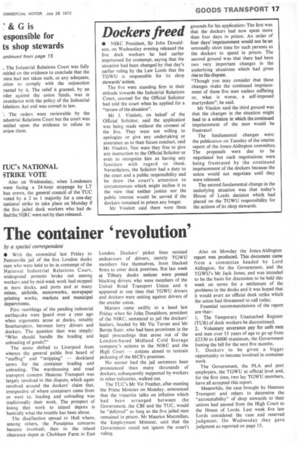Dockers freed
Page 19

If you've noticed an error in this article please click here to report it so we can fix it.
• NIRC President, Sir John Donaldson, on Wednesday evening released the five dock workers he had earlier imprisoned for contempt, saying that the situation had been changed by that day's earlier ruling by the Law Lords that the TGWU is responsible for its shop stewards' action.
The five were standing firm in their attitude towards the Industrial Relations Court, counsel for the Official Solicitor had told the court when he applied for a "review of the situation".
Mr J. Vinelott, on behalf of the Official Solicitor, said the applicatiod was being made without the consent of the five. They were not willing to apologize or give any undertaking or assurance as to their future conduct, said Mr Vinelott. Nor were they free to give any instruction to the Official Solicitor or even to recognize him as having any function with regard to, them. Nevertheless, the Solicitor had a duty to the court and a public responsibility and he drew the court's attention to circumstances which might incline it to the view that neither justice nor the public interest would be served if the dockers remained in prison any longer.
Mr Vinelott said there were three grounds for his application: The first was that the dockers had now spent more than four days in prison. An order of four days' imprisonment would not be an unusually short time for such persons as the dockers to spend in prison. The second ground was that there had been two very important changes in the underlying situations which had given rise to the dispute.
"Though you may consider that these changes make the continued imprisonment of these five men useless suffering or, what is worse, a self-imposed martyrdom", he said.
Mr Vinelott said the third ground was that the changes in the situation might lead to a solution in which the continued imprisonment of the men would be frustrated.
The fundamental changes were: the publication on Tuesday of the interim report of the Jones-Aldington committee. The proposals were due to be negotiated but such negotiations were being frustrated by the continued imprisonment of the dockers because the union would not negotiate until they were released.
The second fundamental change in the underlying situation was that today's House of Lords decision which had placed on the TGWU responsibility for the actions of its shop stewards.




























































































